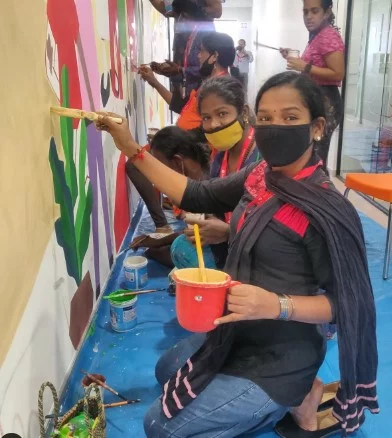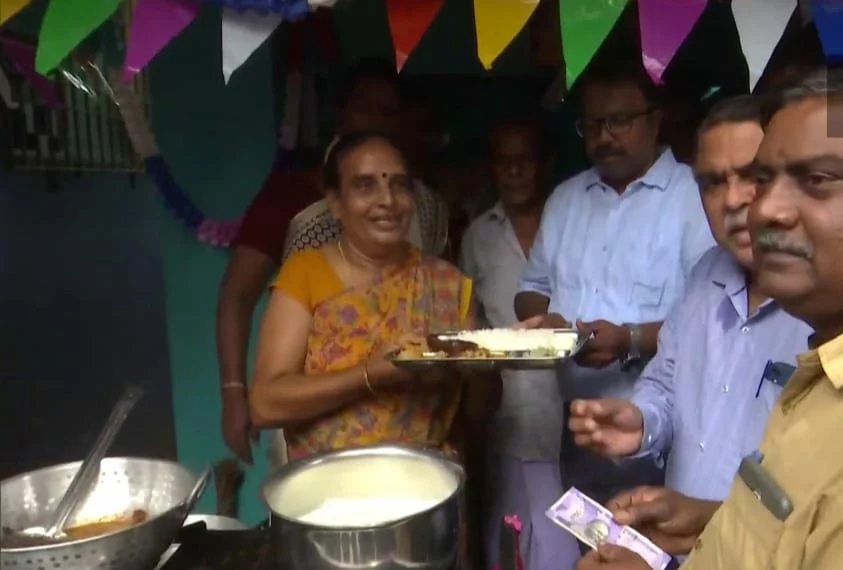Read in : தமிழ்
After turning 50, Mahalakshmi recently opened a restaurant near Tondiarpet clocktower. She wanted to make a living and be independent after years as a bar dancer and folk artiste. Her friend, Trisha works at Indian Oil Corporation. Another, Varsha is a painter. But this is not the story of three women friends who are in traditionally male professions. All three are transgenders.
Transgenders are still largely a community that lives on the margins of society. Disowned by families and scorned by employers, begging and sex work is often their only recourse to earning a livelihood. But many are skilling themselves and taking up regular jobs. Still facing discrimination and having to compromise on a few aspects, these transgenders are nevertheless on the verge of integration with society. Help from NGOs and the government has facilitated their progress.
When Raja was ten years old, he felt he was a female but in a male’s body. Growing up, he too was subjected to sexual harassment and his family didn’t accept his orientation. He was befriended by transgender who knew exactly what he was going through. She helped him get the surgery necessary to become a transgender.
Raja went to Mumbai, became Radha and danced at bars to support himself. When she turned 21, she returned to Tamil Nadu. Radha joined a folk dance group that toured villages to perform at festivals in temples. And it was at one such village festival that she was reunited with her who were in the audience.
Many transgenders are skilling themselves and taking up regular jobs. Still facing discrimination and having to compromise on a few aspects, these transgenders are nevertheless on the verge of integration with society
Trisha has been working at the Bharat Petroleum Corporation for 17 years now. When applying for the job, the officials at the oil company said they would give her a job but only if she promised to dress in shirt and trousers to work. She was forbidden from wearing a saree.
Also Read: How the pain of a transgender turns spiritual
Varsha, who hails from Salem, and her friends have been working as painters. Their work adorns the walls of several Metro stations in Chennai. They have gone as far as Thoothukudi Neythal Thiruvizha to paint.
 When her mother fell sick two years later, Mahalakshmi went back to her village, but as a man so no one would ask questions. She went on to perform the last rites for her mother as a man and came to Chennai. Still in man’s clothes, she was able to get a house for rent as the landlord thought she was a man.
When her mother fell sick two years later, Mahalakshmi went back to her village, but as a man so no one would ask questions. She went on to perform the last rites for her mother as a man and came to Chennai. Still in man’s clothes, she was able to get a house for rent as the landlord thought she was a man.
Mahalakshmi then launched a small food business near her house. Snehithi, an NGO, helped her to start a restaurant on her own that serves breakfast and lunch.
Soon enough, the landlord came to know she was a transgender but fortunately he accepted her orientation and let her stay on. Mahalakshmi has been living at the same house in Tondiarpet for nearly 17 years now, she say. She adds that too often the only family transgenders have is a community of transgenders. They stay together, assume family roles of mother, sister and support each other. But is quick to say that she has been lucky.
Mahalakshmi’s experience has been positive. She says her customers don’t care who or what she is. But the shadow of her past continues to loom. She has learned a bitter lesson that she is better off in male attire at places where men gather. So she is dressed as a male at her restaurant.
Trisha is a customer at Mahalakshmi’s eatery. She was originally was Kuppu. Her parents, however, agreed to accept her as a transgender but on one condition — she was not to do sex work nor go to shops and demand money. She had to take up a regular job, they insisted.
Trisha has been working at the Bharat Petroleum since then. Though she wears a man’s clothes, her colleagues and others at work see her as a transgender. She says her clothes help to bear the family’s burden; she has ensured the marriage of her brother married with her earnings. “We want to lead a normal life and have regular jobs. But society should accept us,” she says.

Mahalakshmi who used to have a food cart has opened a restaurant near Tondiarpet clocktower with the help of Snehithi, an NGO
Meanwhile, Varsha and her community have been adding a splash of colour and form to Metro trains, suburban train stations, the Tidel Park overbridge, schools and settlements across Chennai. The Transgender Art Project that she is a part of has been a source of livelihood for many transgenders.
The only family transgenders have is a community of transgenders. They stay together, assume family roles of mother, sister and support each other
Varsha’s first painting assignment was at a home for children. Their laughter and innocence were an inspiration, she says. Her next assignment was for the school for children of HIV infected. A string of assignments followed soon after.
Also Read: At the vanguard of the protest, transgenders in Tuticorin
A high point for Varsha was a meeting with Thoothukudi MP K. Kanimozhi. This was an occasion for Varsha and her friends to talk about their needs to a sympathetic ear. Kanimozhi responded by having Varsha and her friends paint the walls of houses during the Neythal Festival at her constituency. “If government and wider society facilitates our employment, we will also live like everyone else with dignity instead of being an object of ridicule,” she says.
Varsha says she has borne the marriage expenses of her two sisters. She has adopted a transgender as her child who has studied fashion designing.
“We are like everyone else. If we get jobs as per our skills, we can live with self-respect. We can support our families,” says Varsha.
Read in : தமிழ்











